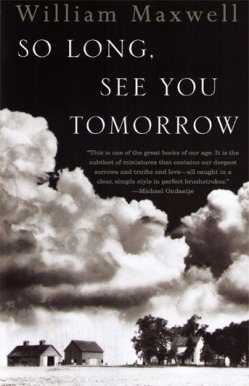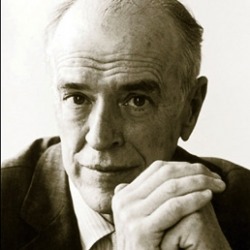In William Maxwell’s compact novel, So Long, See You Tomorrow, the separate yet touching realms of the reader and the writer are recognized. Maxwell will interject his narrative with a quick address such as, “The reader will also have to do a certain amount of imagining…” (p. 56). And isn’t that the aim of a good novel? To encourage the reader to expand her own imagination, to create a world with the help of a literary friend?
The Village Voice wrote that, “William Maxwell is one of the past half-century’s unmistakably great novelists.” and after completing this small novel, my admiration nearly matches that of the Village Voice.
So Long, See You Tomorrow is a classic American novel about childhood and loss, about regret and remembrance. The author recounts his vulnerable friendship with a troubled farm boy, Cletus. Both boys must navigate through loss and confusion. The narrator struggles with the death of his mother, while Cletus witnesses the unraveling of his family and his father. Both boys find themselves placed in situations that they have no control over, a state that almost all children and adults have experienced.
But the heart of the novel lies in the relationship between Cletus’ father, Clarence and a neighboring farmer, Lloyd Wilson. On a cold morning, before daybreak, a shot rings out in the countryside, and Wilson is found dead, shot by his former best friend, Clarence. In a smaller act of betrayal, the narrator abandons his friendship with Cletus due to the murder of Lloyd Wilson, and this act haunts him throughout his adolescence and adulthood.
In an effort to explore his own regret, the narrator delves into the past and recounts the lives and events that led to this dramatic display of violence. Maxwell paints a haunting pastoral picture and imparts vitality to characters that could easily have fallen flat. Through concise yet stirring imagery, Maxwell exposes the reality of rural life and depicts the heartbreaking emotions and consequences of human relationships. On one hand a coming-of-age story, on the other hand a powerful sketch of human weakness, So Long, See You Tomorrow is a small novel that stays with the reader long after the final page.


 RSS Feed
RSS Feed
